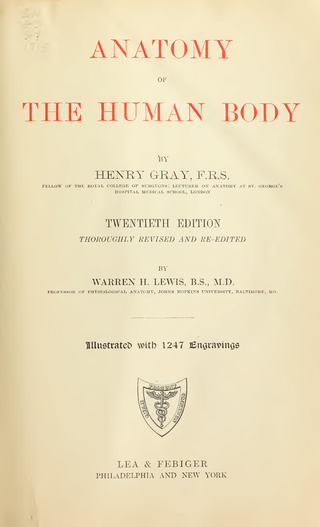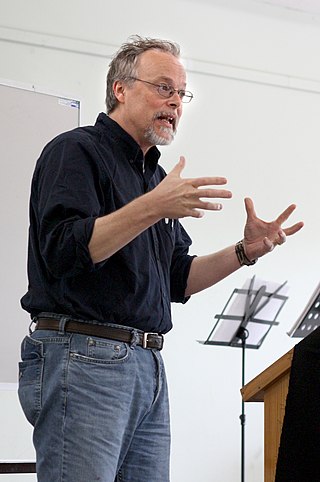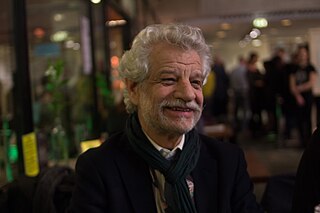The International African Institute (IAI) was founded in 1926 in London for the study of African languages. Frederick Lugard was the first chairman ; Diedrich Hermann Westermann and Maurice Delafosse (1926) were the initial co-directors.

Gray's Anatomy is a reference book of human anatomy written by Henry Gray, illustrated by Henry Vandyke Carter and first published in London in 1858. It has had multiple revised editions, and the current edition, the 42nd, remains a standard reference, often considered "the doctors' bible".

Longman, also known as Pearson Longman, is a publishing company founded in 1724 in London, England, which is owned by Pearson PLC.

Penguin Books Limited is a British publishing house. It was co-founded in 1935 by Allen Lane with his brothers Richard and John, as a line of the publishers The Bodley Head, only becoming a separate company the following year. Penguin revolutionised publishing in the 1930s through its inexpensive paperbacks, sold through Woolworths and other stores for sixpence, bringing high-quality fiction and non-fiction to the mass market. Its success showed that large audiences existed for serious books. It also affected modern British popular culture significantly through its books concerning politics, the arts, and science.
Pearson Education, known since 2011 as simply Pearson, is the educational publishing and services subsidiary of the international corporation Pearson plc. The subsidiary was formed in 1998, when Pearson plc acquired Simon & Schuster's educational business and combined it with Pearson's existing education company Addison-Wesley Longman. Pearson Education was restyled as simply Pearson in 2011. In 2016, the diversified parent corporation Pearson plc rebranded to focus entirely on education publishing and services, and as of 2023 Pearson Education is Pearson plc's main subsidiary.
Ralph Henry Carless Davis was a British historian and educator specialising in the European Middle Ages. Davis was born and died in Oxford. He was a leading exponent of strict documentary analysis and interpretation, was keenly interested in architecture and art in history, and was successful at communicating to the public and as a teacher.

Daniel L. Smith-Christopher is an American Hebrew Bible scholar and author. He is Professor of Theological Studies and Director of New Zealand Study Abroad Programs at Loyola Marymount University in Los Angeles, and is frequently quoted on the History Channel's religious programs.
Roger Lockyer was an English historian, academic, and writer. He had been educated at Pembroke College, Cambridge. He was a reader in history at Royal Holloway, University of London for many years, specialising in research and writing on the Tudor (1471-1603) and Stuart (1603-1714) periods.
Scott Thornbury is an internationally recognized academic and teacher trainer in the field of English Language Teaching (ELT). Along with Luke Meddings, Thornbury is credited with developing the Dogme language teaching approach, which emphasizes meaningful interaction and emergent language over prepared materials and following an explicit syllabus. Thornbury has written over a dozen books on ELT methodology. Two of these, 'Natural Grammar' and 'Teaching Unplugged', have won the British Council's "ELTon" Award for Innovation, the top award in the industry.

Thomas Elsaesser was a German film historian and professor of Film and Television Studies at the University of Amsterdam. He was also the writer and director of The Sun Island, a documentary essay film about his grandfather, the architect Martin Elsaesser. He was married to scholar Silvia Vega-Llona.
Krishna Kumar is an Indian intellectual and academician, noted for his writings on the sociology and history of education. His academic oeuvre has drawn on multiple sources, including the school curriculum as a means of social inquiry. His work is also notable for its critical engagement with modernity in a colonized society. His writings explore the patterns of conflict and interaction between forces of the vernacular and the state. As a teacher and bilingual writer, he has developed an aesthetic of pedagogy and knowledge that aspires to mitigate aggression and violence. In addition to his academic work, he writes essays and short stories in Hindi, and has also written for children. He has taught at the Central Institute of Education, University of Delhi, from 1981 to 2016. He was also the Dean and Head of the institution. From 2004 to 2010, he was Director of the National Council of Educational Research and Training (NCERT), an apex organization for curricular reforms in India. He was awarded the Padma Shri by the President of India in 2011.
Ellen G. Friedman is an American author, editor, and Professor of English and Women's & Gender Studies at The College of New Jersey where she serves as Coordinator of the Holocaust and Genocide Studies program. Friedman is on the Undergraduate, Graduate, and Honors Faculties. She is the advisor to The Women's Center. Her current research is in cultural and gender studies.
Alexander Lyon Macfie is a British historian who has written widely on historiography and Orientalism. Macfie completed his undergraduate studies at the University of Manchester in the 1950s, later completing a PhD. More recently, he has been closely associated with the Institute of Historical Research at the University of London and their philosophy of history seminar, attendance at which has influenced his thinking on historiography.

John William Hiden (1940-2012) was a British historian who was emeritus professor of Baltic studies at Bradford University and senior research fellow at Glasgow University. He was a specialist in modern German history and the history of the Baltic republics, and advised the British government at the time when the Baltic states were reaching independence.
Cyril Raymond Howard Shaw is a British teacher and writer, specialising in crime fiction. He is a former head of history at Harrow School.
Paul Adelman is a British historian who specialises in British political history of the nineteenth century and the first half of the twentieth century. Adelman has written four volumes in the popular Seminar Studies in History series, intended for undergraduate and younger study, and two in the Access to History series from Hodder intended for pre-university study. Adelman has also written for a number of journals, including History Today. He is a former school teacher and reader in history at Kingston University.
Rex Pope is a British historian who was formerly head of the school of historical and critical studies at Lancashire Polytechnic. Pope is a specialist in the social and economic history of Britain in the later nineteenth and twentieth centuries. He has had two volumes published in the Seminar Studies in History series. Pope's other interests relate to the British hotel industry since 1850 and leisure hotels and tourism in the late nineteenth and early twentieth centuries.
David G. Williamson is a British historian, writer, and lecturer. He is the former head of history and politics at Highgate School. Williamson specialises in the history of Germany in the nineteenth century and the first half of the twentieth century, and the military history of the Second World War. He has written two volumes in the popular Seminar Studies in History series and two in the Campaign Chronicles series.

John Cornelius Moorfield, also known as Te Murumāra, was a New Zealand academic whose expertise was in the teaching of the Māori language. His work, including the publication of resources for learners of the language, contributed to the language's revitalisation.
Beth Severy-Hoven is Professor of the Classical Mediterranean and Middle East at Macalester College. She is an expert in Roman history and archaeology, and gender and sexuality in antiquity.







